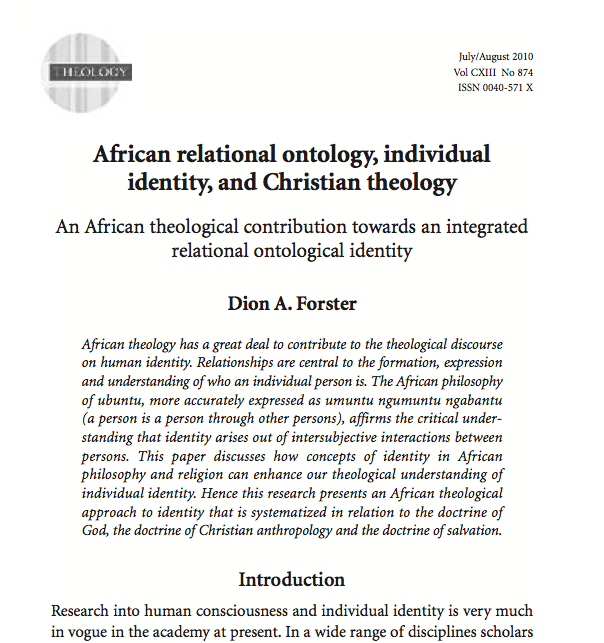Tuesday
Apr202010
African relational ontology, individual identity, and Christian theology
 Tuesday, April 20, 2010 at 9:44PM
Tuesday, April 20, 2010 at 9:44PM  Yup, the title of this post is a mouthful... It happens to be the title of an academic article that I wrote some time ago that is being published.
Yup, the title of this post is a mouthful... It happens to be the title of an academic article that I wrote some time ago that is being published.
The article will be published in the July / August edition of the SPCK Journal 'Theology'. This is by far the most prestigious journal in which I have had the privilege to publish an article. I am truly amazed that it was accepted, and humbled to have it there.
Perhaps the title was so obscure that they thought it was worth a chance!? The full title of the article is
African relational ontology, individual identity, and Christian theology: An African theological contribution towards an integrated relational ontological identity (Theology, July/August 2010 Vol CXIII No 874 ISSN 0040-571 X).
The article comes from a body of research that I conducted over a period of some years in which I investigated the problem of individual identity (what does it mean to be 'me'). How is my identity formed in relation to other persons and my context? And what aspects of the Kosmos can be relied upon to validate who I truly am? Do I rely on my appearance, or my experiences, or is there something more concrete and substantial to 'true identity'?
This article focusses on the importance of relationships and intersubjective identity as the locus of understanding who we are as human persons. It relates these important social aspects of our identity to three prominent Christian doctrines (the doctrine of God, the doctrine of Christian anthropology and the doctrine of soteriology (salvation) - it is something of a systematic approach).
I have another article from this same body of research that contains more of the neuroscience and psychology of identity that will be published in the South African Journal HTS later this year. And then I am still working on the book 'Why you may not be who you think you are. Adventures in neuroscience, artificial intelligence and philosophy' (I am under contract to Cambridge Scholars Press for this book).
Here's the abstract for this article in 'Theology'.
African theology has a great deal to contribute to the theological discourse on human identity. Relationships are central to the formation, expression and understanding of who an individual person is. The African philosophy of ubuntu, more accurately expressed as umuntu ngumuntu ngabantu (a person is a person through other persons), affirms the critical under- standing that identity arises out of intersubjective interactions between persons. This paper discusses how concepts of identity in African philosophy and religion can enhance our theological understanding of individual identity. Hence this research presents an African theological approach to identity that is systematized in relation to the doctrine of God, the doctrine of Christian anthropology and the doctrine of salvation.
If you're interested in reading more about my research in this area, and various other thoughts on neuroscience, identity and Christian theology please follow this link.




Reader Comments (3)
Is there any chance you can email me the full texts of your articles, Dion. As you know, it relates very much to what I am doing my doctoral dissertation on. Thanks! (We must do coffee again soon).
Marius
Done my friend! Shout if they don't arrive.
Blessings,
D
As I have sometimes noted, "Umuntu ungumuntu ngabantu" is also a good expression of Orthodox anthropology, and I wonder if you have read <I>The freedom of morality by Christos Yannaras. Here's a quotation:
"In everyday speech we tend to distort the meaning of the word 'person'. What we call 'person' or 'personal' designates rather more the individual. We have grown accustomed to
regarding the terms 'person' and 'individual' as virtually synonymous, and we use the two indifferently to express the same thing. From one point of view, however, 'person' and
'individual' are opposite in meaning. The individual is the denial or neglect of the distinctiveness of the person, the attempt to define human existence using the objective
properties of man's common nature, and quantitative comparisons and analogies. Chiefly in the field of sociology and politics the human being is frequently identified with the
idea of numerical individuality. Sometimes this rationalistic process of leveling out is considered progress, since it helps to make the organization of society more efficient."